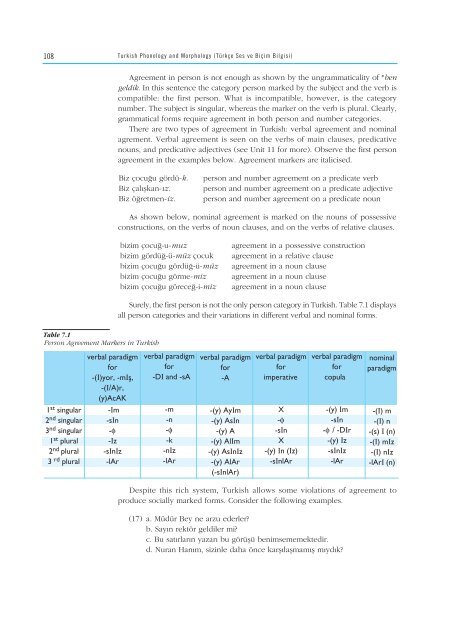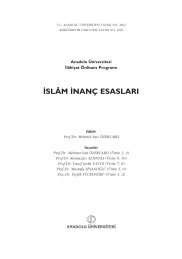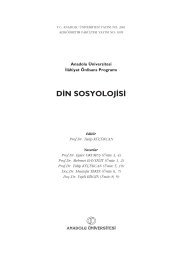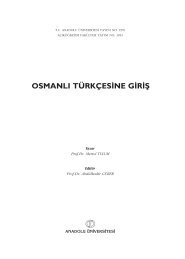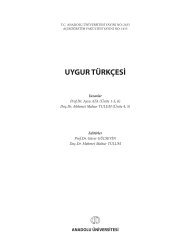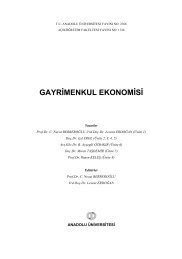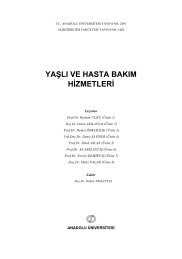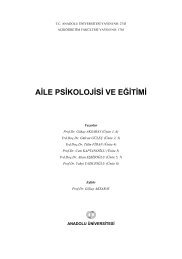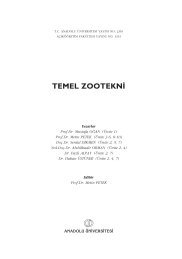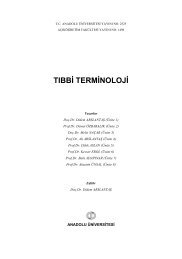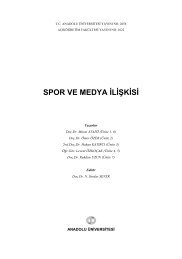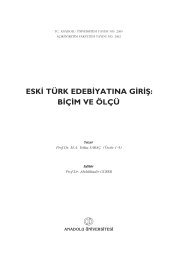turkish phonology and morphology (türkçe ses ve b‹ç‹mb‹lg‹s‹)
turkish phonology and morphology (türkçe ses ve b‹ç‹mb‹lg‹s‹)
turkish phonology and morphology (türkçe ses ve b‹ç‹mb‹lg‹s‹)
You also want an ePaper? Increase the reach of your titles
YUMPU automatically turns print PDFs into web optimized ePapers that Google loves.
108<br />
Table 7.1<br />
Person Agreement Markers in Turkish<br />
1 st singular<br />
2 nd singular<br />
3 nd singular<br />
1 st plural<br />
2 nd plural<br />
3 rd plural<br />
<strong>ve</strong>rbal paradigm<br />
for<br />
-(Ι)yor, -mΙfl,<br />
-(Ι/A)r,<br />
(y)AcAK<br />
-Ιm<br />
-sΙn<br />
-φ<br />
-Ιz<br />
-sΙnΙz<br />
-lAr<br />
Turkish Phonology <strong>and</strong> Morphology (Türkçe Ses <strong>ve</strong> Biçim Bilgisi)<br />
Agreement in person is not enough as shown by the ungrammaticality of *ben<br />
geldik. In this sentence the category person marked by the subject <strong>and</strong> the <strong>ve</strong>rb is<br />
compatible: the first person. What is incompatible, howe<strong>ve</strong>r, is the category<br />
number. The subject is singular, whereas the marker on the <strong>ve</strong>rb is plural. Clearly,<br />
grammatical forms require agreement in both person <strong>and</strong> number categories.<br />
There are two types of agreement in Turkish: <strong>ve</strong>rbal agreement <strong>and</strong> nominal<br />
agrement. Verbal agreement is seen on the <strong>ve</strong>rbs of main clau<strong>ses</strong>, predicati<strong>ve</strong><br />
nouns, <strong>and</strong> predicati<strong>ve</strong> adjecti<strong>ve</strong>s (see Unit 11 for more). Obser<strong>ve</strong> the first person<br />
agreement in the examples below. Agreement markers are italicised.<br />
Biz çocu¤u gördü-k. person <strong>and</strong> number agreement on a predicate <strong>ve</strong>rb<br />
Biz çal›flkan-›z. person <strong>and</strong> number agreement on a predicate adjecti<strong>ve</strong><br />
Biz ö¤retmen-iz. person <strong>and</strong> number agreement on a predicate noun<br />
As shown below, nominal agreement is marked on the nouns of pos<strong>ses</strong>si<strong>ve</strong><br />
constructions, on the <strong>ve</strong>rbs of noun clau<strong>ses</strong>, <strong>and</strong> on the <strong>ve</strong>rbs of relati<strong>ve</strong> clau<strong>ses</strong>.<br />
bizim çocu¤-u-muz agreement in a pos<strong>ses</strong>si<strong>ve</strong> construction<br />
bizim gördü¤-ü-müz çocuk agreement in a relati<strong>ve</strong> clause<br />
bizim çocu¤u gördü¤-ü-müz agreement in a noun clause<br />
bizim çocu¤u görme-miz agreement in a noun clause<br />
bizim çocu¤u görece¤-i-miz agreement in a noun clause<br />
Surely, the first person is not the only person category in Turkish. Table 7.1 displays<br />
all person categories <strong>and</strong> their variations in different <strong>ve</strong>rbal <strong>and</strong> nominal forms.<br />
<strong>ve</strong>rbal paradigm<br />
for<br />
-DΙ <strong>and</strong> -sA<br />
-m<br />
-n<br />
-φ<br />
-k<br />
-nΙz<br />
-lAr<br />
<strong>ve</strong>rbal paradigm<br />
for<br />
-A<br />
-(y) AyΙm<br />
-(y) AsΙn<br />
-(y) A<br />
-(y) AlΙm<br />
-(y) AsΙnΙz<br />
-(y) AlAr<br />
(-sΙnlAr)<br />
<strong>ve</strong>rbal paradigm<br />
for<br />
imperati<strong>ve</strong><br />
X<br />
-φ<br />
-sΙn<br />
X<br />
-(y) Ιn (Ιz)<br />
-sΙnlAr<br />
<strong>ve</strong>rbal paradigm<br />
for<br />
copula<br />
-(y) Ιm<br />
-sΙn<br />
-φ / -DΙr<br />
-(y) Ιz<br />
-sΙnΙz<br />
-lAr<br />
Despite this rich system, Turkish allows some violations of agreement to<br />
produce socially marked forms. Consider the following examples.<br />
(17) a. Müdür Bey ne arzu ederler?<br />
b. Say›n rektör geldiler mi?<br />
c. Bu sat›rlar›n yazar› bu görüflü benimsememektedir.<br />
d. Nuran Han›m, sizinle daha önce karfl›laflmam›fl m›yd›k?<br />
nominal<br />
paradigm<br />
-(Ι) m<br />
-(Ι) n<br />
-(s) Ι (n)<br />
-(Ι) mΙz<br />
-(Ι) nΙz<br />
-lArΙ (n)


